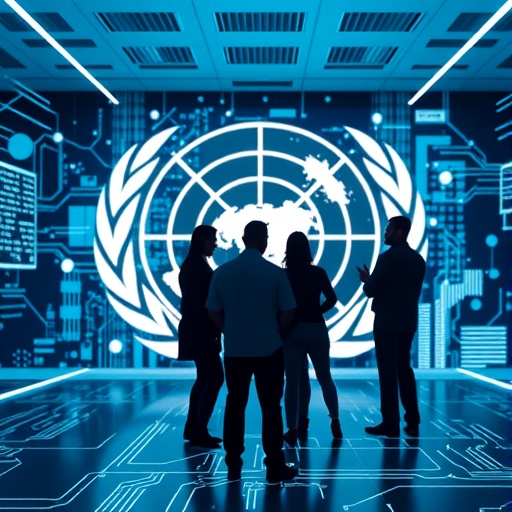The International Telecommunication Union (ITU), the United Nations specialized agency dedicated to information and communication technologies, has launched a groundbreaking initiative to deepen its engagement with the global academic community. This new effort seeks to harness insights from leading scholars, researchers, and professors around the world on emerging technologies that are shaping the future of global communications. Through the establishment of an Academic Advisory Body on Emerging Technologies, ITU aims to integrate cutting-edge academic research into its policy and planning frameworks, thereby ensuring that the evolving digital landscape benefits society as a whole.
Digital transformation is accelerating at an unprecedented pace, driven by breakthroughs in artificial intelligence, quantum computing, space technologies, and other advanced scientific disciplines. Recognizing the complex implications of these changes, ITU’s Academic Advisory Body is designed to operate as a critical conduit for rigorous, forward-looking analysis that spans multiple disciplines. By convening globally renowned experts, this group will supply policymakers with a comprehensive understanding of technological innovation from both a technical perspective and its broader social impact.
The Academic Advisory Body’s 26 members bring a diverse array of expertise and regional perspectives. They represent prestigious institutions worldwide, including universities and specialized research centers known for their contributions to telecommunications, computer science, law, economics, and policy studies. This interdisciplinary composition reflects ITU’s commitment to exploring how emerging technologies intersect with public governance, regulatory frameworks, and international cooperation. Their insights are expected to shape the organization’s strategic foresight activities, supporting evidence-based decisions amid rapid technological change.
Artificial intelligence (AI) stands at the forefront of this exploration. As AI systems become more integrated into communication networks and decision-making processes, questions around transparency, ethics, and regulatory oversight come to prominence. ITU’s advisory group includes experts who specialize in machine learning algorithms, AI governance, and data privacy, ensuring that technical innovations are balanced with considerations of fairness and societal benefit. The ongoing research in AI safety, explainability, and bias mitigation will be crucial for the development of global standards under ITU’s aegis.
Complementing these AI efforts is the focus on quantum technologies, which promise to revolutionize secure communication and computation. Quantum computing and quantum information science offer unparalleled computational power but also pose challenges in cryptography and network architecture. The inclusion of researchers from quantum science centers enables the advisory body to provide nuanced assessments of quantum advancements and their potential disruptions to existing telecommunication infrastructures. By monitoring these developments, ITU can help coordinate international responses to the evolving security landscape.
Space sciences and satellite communications constitute another critical area for ITU’s emerging technology remit. As satellite constellations proliferate and new space-based applications emerge, global coordination is essential to manage spectrum allocation, avoid orbital congestion, and maintain reliable connectivity services. The advisory body’s expertise in space policy, aerospace law, and satellite technology guarantees comprehensive analyses of space-sector innovations and regulatory challenges. This ensures that space-based communication technologies continue to enhance global access without creating new risks.
Beyond technical innovation, the Academic Advisory Body emphasizes the societal implications and equitable distribution of technology benefits. The group is charged with examining how digital divides—whether geographic, economic, or demographic—can be addressed through inclusive policy frameworks. This addresses issues such as broadband access, educational initiatives, and capacity-building in underserved regions, thereby fostering a more inclusive information society. ITU’s longstanding commitment to bridging these divides is strengthened by the academic body’s research-driven recommendations.
The formation of this advisory body underscores ITU’s awareness that rapid technological evolution requires not only reactive governance but proactive anticipation. By synthesizing trends and forecasting future technological trajectories, the body supports ITU’s strategic planning and policy development over the coming years. Their policy briefs and scenario analyses will enhance ITU’s ability to advise member states and stakeholders on emerging risks and opportunities well before they fully materialize.
ITU Secretary-General Doreen Bogdan-Martin expressed optimism about the initiative, highlighting how the collaboration with academia enhances ITU’s mission. By integrating scientific inquiry into the fabric of international telecommunications dialogue, the organization ensures that innovation aligns with global priorities such as sustainability, security, and human rights. This synergy between policy and science is expected to catalyze new approaches to international cooperation in the digital era.
The selection of the initial 26 members reflects a rigorous process focused on individuals’ expertise, academic influence, and leadership in emerging technology fields. Members hold positions at top-tier institutions across multiple continents, ensuring a balanced and global view of emerging trends. Their collective knowledge spans from wireless network engineering to international law, providing ITU with a uniquely comprehensive advisory capacity.
This collaboration also supports ITU’s established publication platforms, including the ITU Journal, by enriching content with academic contributions that address both foundational research and applied policy issues. The exchanges facilitated by the advisory body are poised to enhance the quality and relevance of ITU’s outputs, broadening their impact across government, industry, and academia.
The body’s two-year term is seen as a dynamic phase during which it will pilot mechanisms for academia-to-policy engagement. Lessons learned during this period are anticipated to inform the potential establishment of a permanent forum for ongoing collaboration. As emerging technologies continue to evolve, sustained partnerships between ITU and academic institutions will be critical to navigating the complex challenges of the digital future.
In conclusion, ITU’s establishment of the Academic Advisory Body on Emerging Technologies represents a strategic leap forward in how global telecommunications governance adapts to the demands of the 21st century. By embracing scientific rigor alongside policy expertise, ITU is setting a new precedent for inclusive, multidisciplinary collaboration aimed at fostering technological innovation that serves humanity equitably and responsibly.
Subject of Research: Emerging technologies in digital communications, including artificial intelligence, quantum computing, and space sciences.
Article Title: ITU Launches Academic Advisory Body to Shape the Future of Global Digital Innovation
News Publication Date: Not specified
Web References: https://www.itu.int/en/journal/j-fet/Pages/default.aspx
Image Credits: International Telecommunication Union (ITU)
Keywords: Scientific community, Quantum computing, Artificial intelligence, Telecommunications




